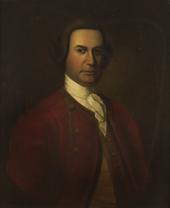Sir William Johnson was born in Smithtown, County Meath, Ireland, in 1715, and came to the colonies in 1738 to manage and improve the Mohawk Valley estate of his uncle, Admiral Sir Peter Warren. He began to colonize this tract, and also embarked in trade with the Indians, whom he always treated with perfect honesty and justice. This course, added to an easy but dignified and affable manner, and an intimacy with them which he cultivated by accommodating himself to their manners and sometimes even to their dress, soon won for him their entire confidence and gave him an influence over them greater than that ever possessed by any other white man. He became a master of the their language, and was thoroughly acquainted with their peculiar habits, beliefs, and customs. The Mohawks adopted him, chose him a sachem, and named him "Waraghiyagey", meaning "Chief Much Business". In 1744 Governor George Clinton appointed Johnson colonel of the Six Nations. In 1746 he was made commissary of New York for Indian affairs, and was active against the French. In February, 1748, he was placed in command of all the New York colonial forces for the defence of the frontier, and prepared a plan of campaign; but the peace of Aix-la-Chapelle stopped all operations. He lived then at Fort Johnson, a large stone dwelling that he had erected on the north side of the Mohawk, directly opposite Warrensburgh, and which he had fortified in 1743, shortly before the beginning of the war with the French. In 1754 he attended, as one of the delegates from New York, the congress of Albany and the great council that was held with the Indians on that occasion, at which they strongly urged his reappointment as their superintendent. At the council of Alexandria, 14 April, 1755, he was sent for by General Braddock, and commissioned by him "sole superintendent of the affairs of the Six United Nations, their allies and dependants." He was also created a major-general, and appointed commander-in-chief of the provincial forces for the expedition against Crown Point. At the head of these forces, in September, 1755, Johnson utterly defeated Baron Dieskau at Lake George. He was wounded in the hip early in the action, but remained on the field of battle. This victory saved the colony from the ravages of the French, prevented any attack on Oswego, and went far to counteract Braddock's disastrous defeat on the Monongahela. General Johnson received the thanks of parliament for this victory, was voted £5,000, and on 27 November, 1755, was created a baronet of Great Britain. In March, 1756, he was commissioned by George II. "colonel, agent, and sole superintendent of the affairs of the Six Nations and other northern Indians, and he held this office for the rest of his life. In 1756 and 1757 he was engaged with his Indians in the abortive attempts of the British commanders to relieve Oswego and Fort William Henry; and in 1758 he was present with Abercrombie at the repulse of Ticonderoga. In General Prideaux's expedition against Fort Niagara in 1759, Sir William Johnson was second in command, and on the death of Prideaux by the explosion of a gun before that fort, he succeeded to the command in chief. He continued the siege with great vigor, routed the French force under Aubry that had been sent to its relief, and then summoned the garrison, which surrendered at discretion. In the following year, 1760, he led the Indians in the Canadian expedition of Amherst, and was present at the capitulation of Montreal and the surrender of Canada, which ended forever the French power in America. His influence alone prevented the Six Nations as a whole from joining Pontiac in the war of 1763, though he could not prevent some acts of hostility by the Senecas. He lived in the style of an English baron, exercising the most unbounded hospitality. As head of the Indian department he concluded the great treaty of Fort Stanwix in 1768, and his death actually resulted from over-exertion in addressing an Indian council on a very warm day. He had many mistresses, both Indian and white, and one, "Molly," Brant, the sister of Thayendanegea, or Joseph Brant, the Mohawk sachem, whom later he took to his house, and with whom he lived happily till his death, has sometimes been termed his wife. He died on July 11, 1774 in Johnstown, New York.
Try the BEST MySpace Editor and MySpace Backgrounds at MySpace Toolbox !
